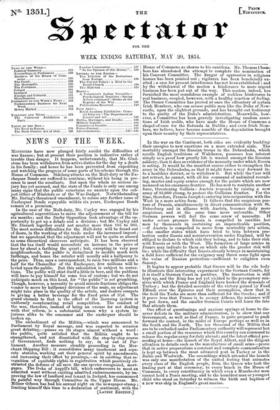NEWS OF THE WEEK.
MixisrEss have now plunged fairly amidst the difficulties of war finance ; but at present their position is indicative rather of trouble than danger. It happens, unfortunately, that Mr. Glad- stone has been withdrawn from active duties for the day by a death in his family; and hence he has been prevented from expediting and watching the progress of some parts of his scheme through the House of Commons. Sidelong attacks on the Malt-duty or the Ex- chequer Bonds are suffered to continue, without his being in pre- sence to meet the assailants. But upon the whole no serious in- jury has yet accrued, and the state of the Funds is only one among many signs that the public entertains no anxiety upon the sub- ject either of Ministers or of the War-Budget. Notwithstanding Mr. Baring's threatened amendment, to refuse any further issue of Exchequer Bonds repayable within six years, Exchequer Bonds -remain at a premium. In the case of the Malt-duty, Mr. Cayley was engaged by his agricultural superstitions to move the adjournment of the bill for six months ; and the Derby Opposition took advantage of the op- portunity to get up a debate and a division ; but Mr. Cayley and Mr. Disraeli together could not muster more than 195 to 303. The most serious difficulties for the Malt-duty will be found out of doors, in the working of the trade under the increased impost ; but we apprehend that the adjustment will not be quite so absurd as some theoretical observers anticipate. It has been observed that the tax itself would necessitate an increase in the price of beer by about a farthing the quart ; but, excepting in very poor neighbourhoods, the public is disinclined to meddle much with farthings, and hence the retailer will usually add a halfpenny to the price. Thus, says a correspondent, to raise two millions and a half for the Chancellor of the Exchequer, five millions will be levied upon the public. But this calculation is subject to correc- tions. The public will stint itself a little in beer, and the publican will have to pay himself for some loss of custom; but we do not anticipate much on this head, for "the public" is not grumbling. Though, however, a necessity to avoid minute fractions obliges the vendor to move by halfpenny divisions of the scale, an adjustment might take place in the quality of the article, and dealers compete in giving a better beverage for the fixed price of 33d. The grand obstacle to that is the effect of the licensing system in uniformly counteracting retail competition. The conduct of -the war, therefore, instead of being an excuse for not dealing with that reform, is a substantial reason why a system in- jurious alike to the consumer and the exchequer should be broken up. The embodiment of the Militia,—which was announced to Parliament by Royal message, and was expected to occasion great debating,—passes on its stages almost without a word : the public, - quite satisfied that the Militia ought to be -strengthened, and not dissatisfied with the step-by-step course of Government, finds nothing to say, in or out of Par- liament. Another measure steadily proceeding is the Mer- chant Shipping Bill : it consolidates many incoherent and sepa- rate .statutes, working out their general spirit by amendments, and increasing their effect by prunings,—as in omitting that re- cognition of equitable rights in registration which positively ob- stzneted the defence of all save the one species recognized, mort- gages. The Duke of Argyll's bill, which endeavours to meet an admitted want without exciting admitted embarrassments, by im- proving the law of landlord and tenant in Ireland, has commenced its painful way through Committee in the Upper House. Mr. Milner Gibson has had his annual night on the newspaper-stamp ; limiting himself this time to a declaration of sentiment, with the
House of Commons as chorus to his cantilena. Mr. Thomas Cham- bers has abandoned the attempt to complete the nomination of his Convent Committee. The danger of oppression in religious houses has been pointed out ; vigilance has been beneficially ex- cited ; a case for present interference has not been established ; and by the withdrawal of the motion a hinderance to more urgent business has been put out of the way. This session, indeed, has furnished the most scandalous example of reckless hinderance to real business, coupled, however, with a healthy reaction of feeling. The Stonor Committee has proved at once the effrontery of certain Irish Members, who can accuse public men like the Duke of New- castle, upon the slightest grounds, and has brought out testimony to the purity of the Duke's administration. Meanwhile, how- ever, a Committee has been gravely investigating random asser- tions of Irish scolds, who have made the House of Commons a chapel-of-ease for the Rotunda in Dublin ; and even Irish Mem- bers, we believe, have become sensible of the degradation brought upon their country by their representatives.


























